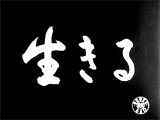
|
Ikiru (1952, Jp.) (aka To Live)
In Akira Kurosawa's humanistic, existential, and poignant
drama (the title meant: "To Live"), it told about a terminally-ill
man who went searching for life's purpose and meaning; the film was
divided into two distinct parts: the first was about the male protagonist's
wasted life, and the second was a series of non-chronological flashbacks
and memories at the protagonist's funeral-wake service:
- the main character was unemotional, rather dull,
longtime, low-level, petty bureaucrat Kanji Watanabe (Takashi Shimura),
a widower with an estranged and greedy son Mitsuo (Nobuo Kaneko)
that he had raised
- for at least three decades, Kanji had worked as
a disagreeable and spirit-lacking Tokyo City Hall office chief
and civil servant (in the position of Public Affairs Section Chief)
in the same monotonous, rubber-stamping job
- Kanji Watanabe learned of his imminent death (forecast
within a year) due to stomach-gastric cancer (seen in the opening
shot of his X-Ray); devastated by the unexpected news (although
the doctor, to lighten the blow, gave him a modified and less serious
diagnosis of an ulcer), he reacted in a depressed, head-down position
as he left the hospital, where he was nearly
killed by a truck with a blaring horn
- upon his return home, he accidentally eavesdropped
on a conversation between his son and daughter-in-law Kazue (Kyoko
Seki) who spoke of their impatience with acquiring Kanji's pension
and inheritance in order to purchase a home of their own - it was
another despairing blow to his life
- the news of the probable, impending end of his life
caused Watanabe to reevaluate what his life had meant in his few
remaining months: ("I don't know what I've been doing with
my life all these years"); he began a search for meaning,
first calling in sick to work, while
'enjoying life' by drinking and frequenting hooch, striptease and
pachinko gambling parlors and other dark locales of the underworld
of Tokyo nightlife; on his nocturnal journey, he was guided by
a dead-beat, eccentric, black-clad writer-novelist whom he met
in a bar - self-described as Mephistopheles (Yunosuke Ito)
- in a Tokyo 'red-light district'
nightclub, the despairing and drunken Watanabe
symbolically sang "Gondola no Uta" - a 1915 dirge song with lyrics about
the fleeting nature of youth, missed opportunities, and the rapid
aging process: ("Fall in love,
dear maiden, While your lips are still red, And before you are
cold, For there will be no tomorrow. Life is so short, Fall in
love, dear maiden, While your hair is still black, And before your
heart withers, For today will not come again"); onlookers
stilled, but felt he was destroying the mood
- he also briefly became close
friends with cheerful and exuberant younger employee Toyo Odagiri
(Miki Odagiri), the only female staffer in his office; she had
just resigned from her life-sapping job, and inspired him to make
a mark with his own life; she also urged him to quit his job as
she had - he told her: "You're so full of life. And me,
I'm jealous of that. If I could be like
you for just one day before I died. I won't be able to die unless
I can do that. I want to do something. Only you can show me. I
don't know what to do. I don't know how. Maybe you don't know either,
but, please, if you can show me how to be like you!"; eventually,
she explained to him how she had found fulfillment in the fast-paced
industrial society via her new job - making toy rabbits for
Japanese children
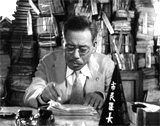
At His Job in Tokyo City Hall: "Busy, always
so very busy...Is this really what life is all about?"
|
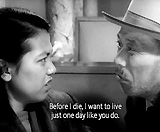
Watanabe To Toyo: "Before I die, I want to
live just one day like you do"
|
- Kanji was inspired to make an uncharacteristically
generous, worthwhile and socially-motivated decision to support
the Kuroe Women's Asssociation's city project to transform a garbage
dump-sewer area in the slum district into a playground and park
for children - it would be his final triumph to support and promote
the project that had been stalled and diverted due
to the bureaucracy, and the counter-efforts of the local yakuza
to turn the area into another profitable 'red-light' district
- in the second instance of singing the dirge
song (on the night of his death, 5 months after his diagnosis),
Watanabe was joyfully rocking slowly back and forth on a swing
in his newly-constructed park during a light snowfall (it also
served as flashback to a policeman finding his body)
- in the second part of the film after Watanabe's
death, there were varying reactions and cynical, judgmental and
gossipy comments from his shallow bureaucratic co-workers (who
were freely drinking sake at the wake) about his passionate, socially-productive
act, with some exhibiting contempt, conjecture, inspiration, credit-claiming,
jealousy, suspicion, confusion, and frustration over the park project;
however, the grieving Kuroe Women's Society gratefully attended
the funeral to pay their respects
- at the wake, Kimura (Shinichi
Himori), the only civil servant in Kanji's office who seemed truly
inspired by his example, was afterwards quickly stifled and sternly repressed
at the office for acting out of place and wanting to support another
oppressed group seeking help; in the film's
final ambiguous frames, it was unclear whether Kimura's newfound
convictions would be realized
|
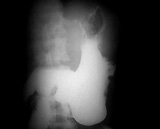
X-Ray Diagnosis of Terminal Stomach Cancer
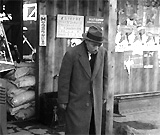

Watanabe's Depressed Reaction to His Diagnosis - Distracted
and Almost Run Over
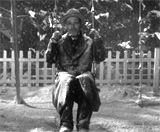
On a Swing in the Newly-Constructed Park on the Night of His Death
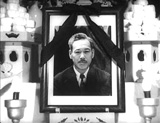
At Watanabe's Wake |






